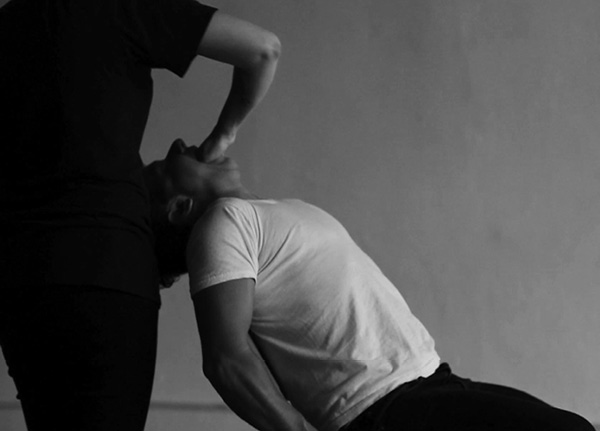
FOR A LONG TIME, ALL I COULD DO WAS SURRENDER
first performed on
July 23, 2011
Red Rover Series, Outer Space Studio, Chicago, IL
performed three times in 2011
MARISSA PEREL & OLIVERIO RODRIGUEZ
New York, NY / Chicago, IL
497500989p497500989e497500989r497500989e497500989l497500989p497500989a497500989r497500989o497500989l497500989e497500989@497500989g497500989m497500989a497500989i497500989l497500989.497500989c497500989o497500989m
marissaperel.com
/
olirodriguez.com
FOR A LONG TIME, ALL I COULD DO WAS SURRENDER
MARISSA PEREL & OLIVERIO RODRIGUEZ
Oli and I were interested in exploring the edge between provocation and exposure with one another through text and action. We had a writing exchange where we each created texts on personal losses (death, rape, gender mis-identification), erotic fantasies that involved BDSM, pain play, boy play, and death play, and responses to watching films in the New French Extremity genre (Ma Mere, 29 Palms, The Piano Teacher, etc.).
Through the combination of writing and observing these films, we created a system of actions that we describe as performative submission. We sought to dominate one another in the context of performance in order to expose the emotional and erotic truths in one another’s writing. We took turns topping one another in our actions and physically pushed one another into submission in front of the audience. In this sense, the audience played the roles of both voyeur and participant. The central problem we sought to address is the function of shame. This is, in part, informed by Douglas Crimp’s essay, “Mario Montez, For Shame,” as quoted in Gay Shame (University of Chicago Press), where he argues for shame as a necessary dimension of queer sexuality that defines its difference.
By targeting our shame, submitting to it, we sought to perform the complex dynamics between eros and loss that contribute as much to identity formation as affirmative, life-positive belief structures. Within this way of thinking, there is room for humiliation, debasement, and fantasy in a performance context where the true strength of the performers lies in their ability to relinquish control. In this sense, we each created a set of constraints to make one another give way and bear witness to our own narrative underbellies, or the subtext of our identities in a literal sense.